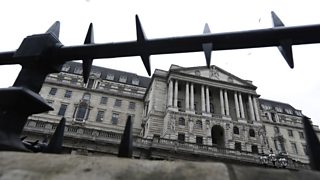
25 billion pounds is an awful lot of money. As this it's bigger than both the UK government's transport, and its housing and environment budgets.
But it's an amount of money that our biggest banks and building societies will have to raise by the end of this year, with more to follow next.
And that money would go towards capital, which is the financial buffer any company holds between health and oblivion. It's made up of cash or other assets you can sell easily when you have to (like government bonds).
The Bank of England's new Financial Policy Committee (which has been given the task of looking after the overall safety of our financial system) because there are billions of pounds worth of bad loans, mis-selling costs and risks that haven't been accounted for adequately by many - but not all - of our big banks and building societies (we don't yet know exactly which ones).
Defenders of the higher requirements say that a safer, more financially robust bank, is better able to lend, and inspires greater confidence in potential savers and commercial lenders.
Critics say the Bank of England is asking them to make themselves far safer than they need to be, and money that would have been lent to customers will now be carted down to the vaults for safe keeping.
The Bank of England says that banks and building societies "meet the requirements鈥y issuing new capital or restricting balance sheets in a way that does not hinder lending to the economy".
It all depends where the 拢25bn comes from. Banks have already identified ways to find half of the 拢25bn. But that still leaves a lot more still to get. Where are the possible sources? It's not the sort of money you find down the back of a sofa after all.
1. Taxpayers
This would only be an option you'd have thought for those banks that already have a big taxpayer stake - namely RBS and Lloyds HBOS. However, the without tapping taxpayers. So that seems to be a non starter.
2. Take it from bank profits
HSBC, the bank making the most money right now (拢13.73bn in 2012) is the least likely to need extra safety cushions. It could raise money by diverting profits, but probably won't need to. It's always held bigger capital buffers than other UK rivals. It may indeed be one of those the inspectors gave a聽clean bill of health to. Sods law though dictates that the more a bank is likely to need extra capital, the less money it tends to make.
Barclays only made 拢246m in 2012, peanuts compared to its overall size. And RBS and Lloyds HBOS - prime candidates for needing billions more capital - made losses last year, the former, a stonkingly big one. Banks could of course cut costs further to try to improve profitability by cutting pay and benefits for staff.
However, though hiving off money from profits is desirable, the weak profits in the industry make it perhaps unlikely.
3. Sell off businesses
This is more likely. Last year, RBS group floated its Direct Line insurance division as the price demanded by EU regulators for its UK government bailout. , raising hundreds of millions of pounds for them. It might decide in future to , the bank who traditionally count the better off among聽their customers. , the fund manager. It could sell off more. Other similar businesses that aren't core to bread and butter banking would all be candidates for the chop.
4. Raise capital from investors
Back in 2008 Barclays sold a stake in itself to investors from the Gulf. Even the mightly Goldman Sachs had to let Warren Buffet purchase a chunk at the most spine tingling days of the financial crisis in 2008. But selling equity (shares) may not be necessary this time. Banks could ask for money via bonds, which are loans from investors payable back after a fixed period of time which also pay interest. However, investors could ask for insurance policies, which mean those loans turn into stake in the banks, if the banks play fast and loose with their finances.
5. Focus energies in Britain
Banks could sell off more divisions and subsidiaries abroad. It's something they've already been doing since the crisis hit 5 year ago as they have scrambled for funds to cover losses. For example, RBS has announced that it is going to begin the process of selling some of its US business, Citizens, on the stock exchange in about two years. However, that process could continue, more so than they might have liked it left to their own devices). Banks could also of course keep foreign businesses going, but just shrink them in size, and divert some funds tied up there back to UK shores.
Get the latest news and insight from the business world on 5 live's聽.听听
